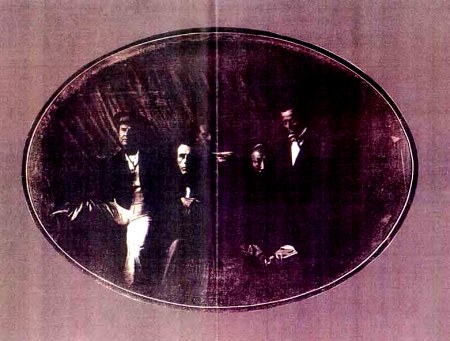- Qiying
Infobox Governor
name = Qiying
honorific-suffix =

imagesize = 200px
caption = Qiying (second from right) with Théodore de Lagrené (second from left) in 1844
order =Viceroy of Liangguang
term_start = 1844
term_end = 1848
predecessor =Qitian
successor =Xu Guangjin
birth_date = birth date|1787|3|21
birth_place =Beijing
death_date = death date and age|1858|6|29|1787|3|21
death_place =
occupation =Politician
spouse =Qiying (Chinese: 耆英; Manchu: Ciyeng; born
21 March 1787 , [Birthdate according to Gao Zhonghua, "Sushun yu Xianfeng zhengju" (Jinan: Qilu shushe, 2005), p. 165, n. 1. ] forced suicide29 June 1858 ) was aManchu statesman during theQing Dynasty .Background and early career
Being a descendant of
Nurhaci 's ninth son Babutai, Qiying was a member of the imperial house ofAisin-Gioro and belonged to the Manchu Plain Blue Banner in theEight Banners . Qiying held several prominent posts in the Qing government and was demoted several times because of corruption in office, but managed to regain his position as a leading official in the Qing court.Role during the Opium Wars
In 1842, the
Daoguang Emperor entrusted Qiying to conclude a peace treaty with the Britain following theFirst Opium War , and he was chiefly responsible for negotiating and signing theTreaty of Nanking with the British on 29 August 1842. In the following years, Qiying also concluded theTreaty of Whampoa with France, theTreaty of Wanghia with theUnited States and the Treaty of Canton withSweden-Norway . This was the first group of treaties known as the "Unequal Treaties" in China.In 1858, the
Xianfeng Emperor ordered Qiying to negotiate a peace treaty with Britain and France in order to conclude theSecond Opium War . During the negotiations, the British interpretersHoratio Nelson Lay andThomas Francis Wade sought to expose Qiying's duplicity by producing documents the British had captured inGuangzhou , in which Qiying expressed his contempt for the British. Humiliated, Qiying promptly left the negotiations in Tianjin for Beijing and he was later arrested for having left his post in contravention of imperial order. He was sentenced to death by the Imperial Clan Court, but was allowed to commit suicide instead.Notes
References
*Fairbank, John King. "The Manchu Appeasement Policy of 1843." "Journal of the American Oriental Society" 59, no. 4 (1939): 469-84.
*Hummel, Arthur William, ed. "Eminent Chinese of the Ch'ing Period (1644-1912)." 2 vols. Washington: United States Government Printing Office, 1943.-
Wikimedia Foundation. 2010.
